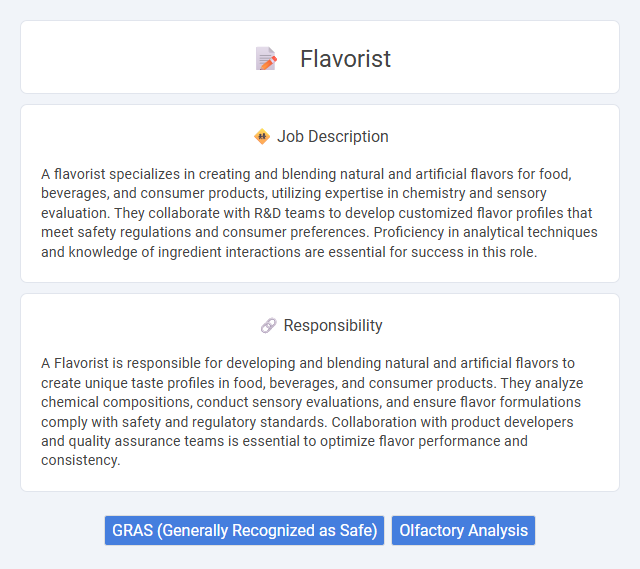
A flavorist specializes in creating and blending natural and artificial flavors for food, beverages, and consumer products, utilizing expertise in chemistry and sensory evaluation. They collaborate with R&D teams to develop customized flavor profiles that meet safety regulations and consumer preferences. Proficiency in analytical techniques and knowledge of ingredient interactions are essential for success in this role.
Individuals with a keen sense of smell and taste are likely suitable for a flavorist role, as these skills are crucial for creating and blending flavors effectively. This job may not be ideal for those with allergies or sensitivities to strong smells and chemicals commonly used in flavor development. Those who enjoy scientific experimentation and have patience for detailed, repetitive processes probably find the flavorist profession fitting and rewarding.
Qualification
A Flavorist requires a strong background in chemistry or food science, typically holding a degree in these fields to understand complex flavor compounds and interactions. Expertise in sensory analysis, flavor creation, and formulation is essential, along with familiarity with regulatory standards and safety protocols. Advanced skills in analytical techniques such as gas chromatography-mass spectrometry (GC-MS) and experience in product development within the food and beverage industry significantly enhance qualifications.
Responsibility
A Flavorist is responsible for developing and blending natural and artificial flavors to create unique taste profiles in food, beverages, and consumer products. They analyze chemical compositions, conduct sensory evaluations, and ensure flavor formulations comply with safety and regulatory standards. Collaboration with product developers and quality assurance teams is essential to optimize flavor performance and consistency.
Benefit
A career as a flavorist offers the probability of working in a highly creative and scientific field, blending artistry with chemistry to develop unique taste experiences. Professionals in this role often enjoy access to cutting-edge technology and the chance to influence products consumed worldwide. Job benefits may also include competitive salaries, opportunities for continuous learning, and collaboration with diverse teams across the food and beverage industry.
Challenge
The flavorist job may present significant challenges due to the intricate balance required between creativity and scientific precision in developing unique, appealing flavors. They might often encounter difficulties in replicating natural tastes while ensuring safety and regulatory compliance. The complexity of ingredient interactions could frequently test their expertise and problem-solving abilities.
Career Advancement
Flavorists develop and create flavors for food, beverages, and consumer products using chemistry and sensory knowledge. Career advancement opportunities include senior flavorist roles, research and development leadership, and specialization in natural or functional flavors. Expert flavorists may progress to executive positions or consultancy roles within the food science and flavor industry.
Key Terms
GRAS (Generally Recognized as Safe)
Flavorists play a crucial role in formulating food and beverage flavors that comply with GRAS (Generally Recognized as Safe) standards set by the FDA, ensuring consumer safety. They meticulously select and blend flavor compounds that have undergone rigorous toxicological evaluations and are listed on the GRAS inventory. Expertise in regulatory guidelines and chemical safety assessments is essential for flavorists to create innovative yet compliant flavors in the food industry.
Olfactory Analysis
Flavorists specialize in creating and modifying flavors by using expertise in olfactory analysis to identify and blend aromatic compounds. Mastery of gas chromatography-olfactometry and sensory evaluation techniques allows flavorists to design complex flavor profiles that meet consumer preferences and regulatory standards. Their work combines chemistry and sensory science to enhance product appeal in the food, beverage, and fragrance industries.
 kuljobs.com
kuljobs.com